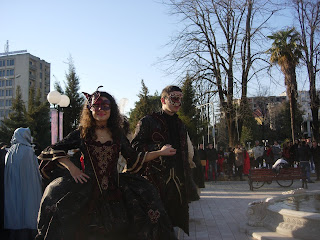 |
| Costumed revelers with mosque in the background |
In my short stay I noticed two particularly nice things about the town. First is an avenue that is closed off to vehicular traffic (a nice reprieve from the car-mania of Tirane). Also I noted that a lot of residents ride bikes instead of driving.
The second particularly nice thing is the siting of a mosque and two Christian churches close enough together that decorative lights can be strung among the three buildings for festivals and special occasions. I can't think of another place that exhibits such religious inclusivity.
The genesis for the carnival celebration (as I understand it) came from the historical connection between Shkodra and Venice, Italy. As mentioned above, Venice actually ruled this area during its heyday, and many of the older buildings show Italian architectural influence. But that connection was a long time ago and it was just one among many. The other important influence revitalizing the festival has been the support of a local businessman who founded a factory that manufactures hand-made, Venetian-style masks for export to Italy and points beyond. The masks are absolutely beautiful.
 |
| Masks from the local factory |
The opening ceremony, which occurred on Saturday afternoon under sunny skies, included speeches by local and visiting politicians, a live band playing covers of North American songs that were popular a few years ago, and some fireworks. The vibe was upbeat and wholesome, kind of like a high school pep rally, but with masks.
The highlights were the groups of young people from all the local schools attired in costumes and masks.
The older youths' costumes were quite elaborate. They all seemed so proud to have been chosen to play an important role that they were not bothered by the cold.
 |
| An excellent turnout |
Warming up with a glass of raki in a nearby bar after the opening ceremony, I wondered about the origins of the festival. Apparently, the vibe at the original Venetian carnival was a good bit darker and more morally ambiguous than it is now. In earlier centuries, the citizens of class-conscious Venice wore masks to conceal their identities, enabling commoners and nobles to mix, and facilitating anonymity among those inclined to illicit or criminal pursuits (of which many were available). As class structures and social mores gradually loosened, the importance of carnival declined. It actually died out for a number of years, not being revived until the late 1970 in Venice and more recently here in Shkoder. In both places, today's carnival is more of a tourist attraction than a vehicle for acting out illicit fantasies. So I wonder what those 13th century Venetians would think of us now?





